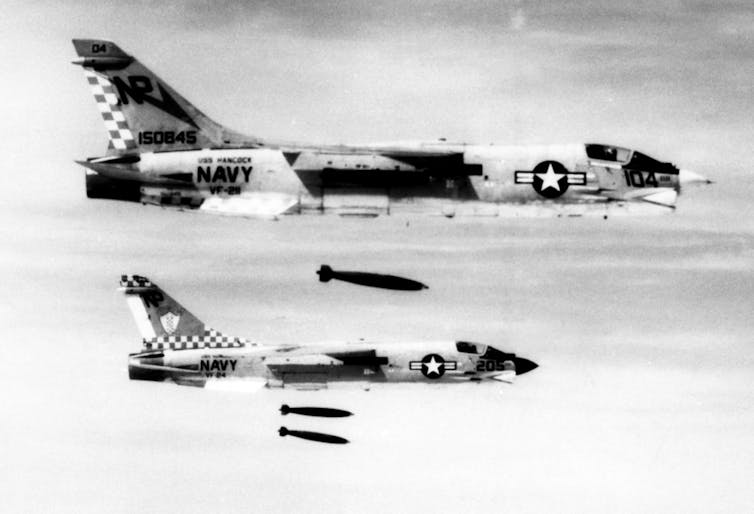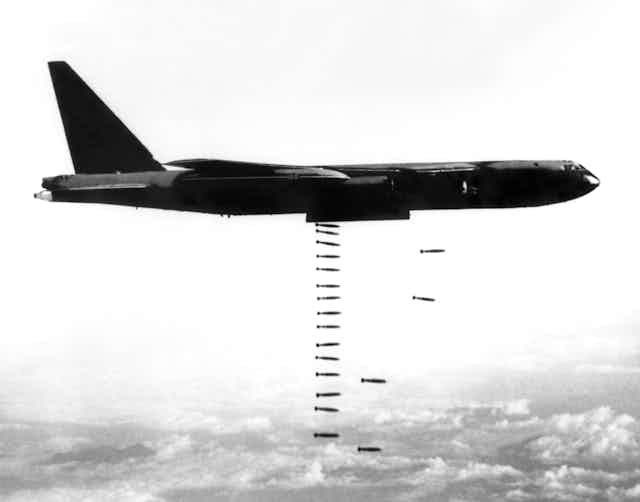The latest bombing campaign in Syria bears a remarkable and worrying resemblance to one of history’s most infamous and flawed military interventions. Operation Rolling Thunder was the aerial assault on North Vietnam which lasted from 1965 to 1968. It was a massive bombardment, hugely destructive and, ultimately, ineffectual.
Because for all the staggering tonnage of bombs dropped (643,000 tons), the ruthless communist regime in North Vietnam – careless of the lives of its people and secure in its support from the USSR and China – was neither deterred nor materially prevented from prosecuting its war against America’s doomed client state in South Vietnam.
One of the reasons for the aerial campaign’s failure was that it was planned around a wholly flawed strategy, based upon an utter miscalculation of how the targeted regime would respond to the bombing. That situation now appears to be repeating itself in Syria.
Read more: Syria: who's involved, and what do they want?

‘Bomb them back into the stone age’
It is often assumed that the US pursued an unrestricted bombing campaign against North Vietnam, a view captured most graphically in General Curtis LeMay’s often quoted threat to “bomb them back into the stone age”. It did not. The policy underpinning the bombing campaign was devised by US Secretary of Defence Robert McNamara and President Lyndon Baines Johnson – and it was based on “graduated escalation”.
North Vietnam would be encouraged to enter negotiations by a decrease in the intensity and frequency of air raids and punished for any aggressive action by a commensurate increase. It was a policy that, 30 years later, MacNamara himself would describe as “wrong, terribly wrong”.
In Hanoi, the waxing and waning of the bombing was perceived not as strength but as weakness, much as the periodic flinging of cruise missiles at a restricted number of targets in Syria, interspersed with long periods of inaction, probably seems to Bashar al-Assad.
Fear of a superpower confrontation
Furthermore, the bombing itself, besides not delivering the intended political dividends, had little material impact on North Vietnam’s capacity to wage war. Johnson, with good reason, was terrified that the conflict might escalate into a superpower confrontation because of the Chinese and Soviet presence on the ground. For much of the war, therefore, no attacks could be made on the harbour at Haiphong, for fear of hitting Soviet ships. So, these could carry on supplying Hanoi with war materials essentially undisturbed.
China was even more of a concern. A deep buffer zone along the North Vietnamese border with China was, for most of the conflict, off-limits to air attack. And, by 1967, some 170,000 Chinese troops were serving in North Vietnam. Some were killed in US air raids but fear of causing significant casualties to Chinese forces caused further restrictions to the bombing campaign.
For two months in 1965, US aircraft were not allowed to attack a formidable belt of surface-to-air missile launch sites that were under construction for fear they might trigger a Chinese or Soviet military response. These missiles would eventually shoot down the fighter of Senator John McCain and hundreds of other US servicemen.
What is the strategy?
The presence of around 4,000 Russian troops in Syria today is exercising a similar influence on the conduct of air strikes.
There are other depressing similarities, too. What, strategically, is the purpose of the air strikes against Syria? As in Vietnam, one intention seems to be to change the behaviour of a brutal and repressive regime. The purpose of air strikes, we have been told by the US president “is to establish a strong deterrent against the production, spread, and use of chemical weapons”. However, given that his last missile strikes against Assad seem to have failed to have any such deterrent effect, why assume this one will?
Another rationale is UK Prime Minister Theresa May’s extraordinary claim that “hitting these targets with the force that we have deployed will significantly degrade the Syrian regime’s ability to research, develop and deploy chemical weapons”.
The very notion that a missile strike by four of the RAF’s elderly Tornados would have a significant effect on Syria’s capacity to wage chemical warfare is arrant nonsense. And if more chemical weapons attacks do now occur in Syria, where will our policymakers go? Will they escalate the pressure – firing more missiles, expending more blood and treasure as America did in Vietnam, to no purpose?
The concern here is not the legality of the air strikes on Syria, a valid question though that is. Rather, now that the decision has been taken to engage in military action, the citizens of the UK, the US and France surely have a right to know why, exactly, it is being done? What is our strategy here and how should we gauge if it has been achieved?
The fear is that world leaders do not have a very convincing answer. Perhaps they have no answer at all. The echoes of Rolling Thunder are there to be heard by those who will listen. Sadly, those in charge so far seem to be deaf to them.
Read more: Syria's latest chemical massacre demands a global response

